How to Improve at Making Decisions
To make good decisions over time, you have to think differently than how you are wired.
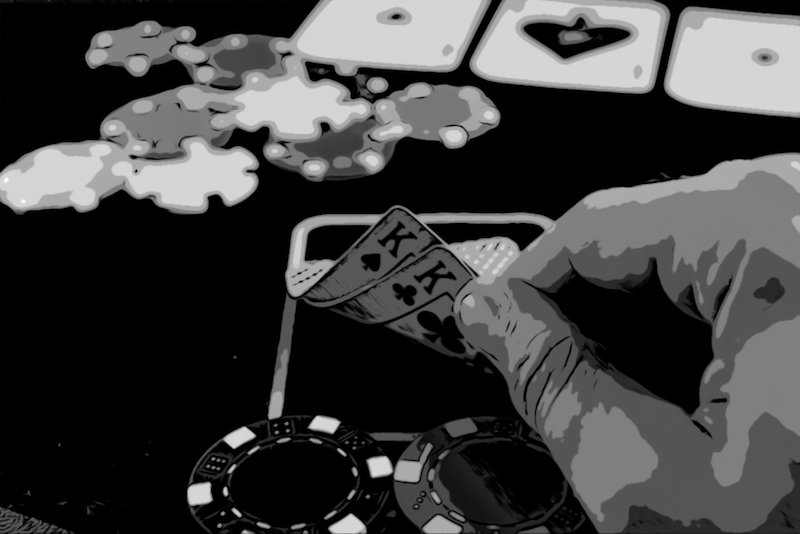
"The pro"
When I was in college, one of my favorite hobbies was playing poker. I organized home games, traveled to casinos, and spent hours playing online. In that time playing, I learned valuable lessons for thinking that helped me in many areas of my career. One of the most important was how to think about decisions.
During this time, I tried to get as many friends as possible interested in playing. I taught them the basics, like fundamental hands and essential probabilities. But the most important lesson was often most difficult to teach.
While visiting Las Vegas during one trip, I convinced my friend to play poker instead of other games at our casino. He ended up involved in a big hand against a guy at our table, who often and loudly told everyone he was a pro. On this hand, "the pro" pushed his chips all in. Everyone folded except my friend, who called his bet after thinking for a few moments.
There is no more betting at this point, the dealer will lay out the rest of the cards, and we see who wins. It was a friendly game, so my friend and "the pro" turned over their cards. My friend had pocket Aces, and "the pro" had a 7 and 8 of Hearts. So my friend had over a 76% chance to win.
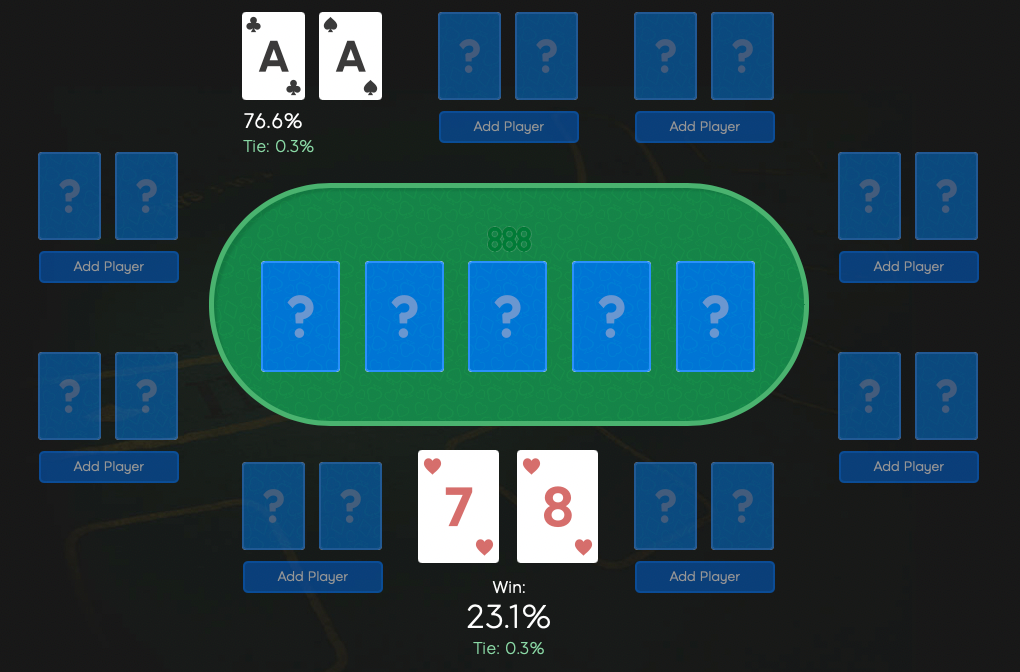
Rewind to a few hours earlier in our hotel room, and I'm giving my friend some essential tips for a new player. I tell him a few solid hands he should always play, and I tell him to be patient. Pocket Aces were one of those hands, so back at the moment of truth, my friend was feeling pretty good.
The first three cards come down - 6 of Hearts, 10 of Diamonds, and 5 of Clubs. So far, so good. "The pro," on the other hand, wasn't feeling too great and urgently looking for a waitress to order his last free beer of the night before he left the table.
But then a Jack of Hearts came. Now at this point, my friend is still in good shape with a 65.4% chance to win. But what he doesn't know, because he is still relatively new, is that if another Heart comes, his pocket Aces will be beaten by a flush. And sure enough, that's just what happens. A 3 of Hearts—bad beat.
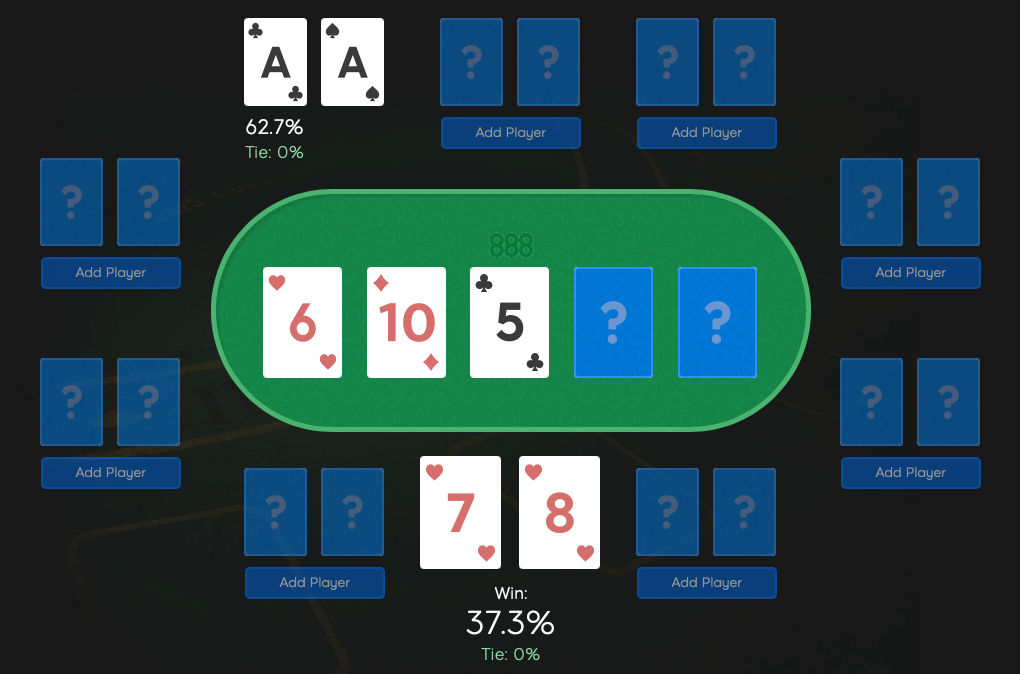
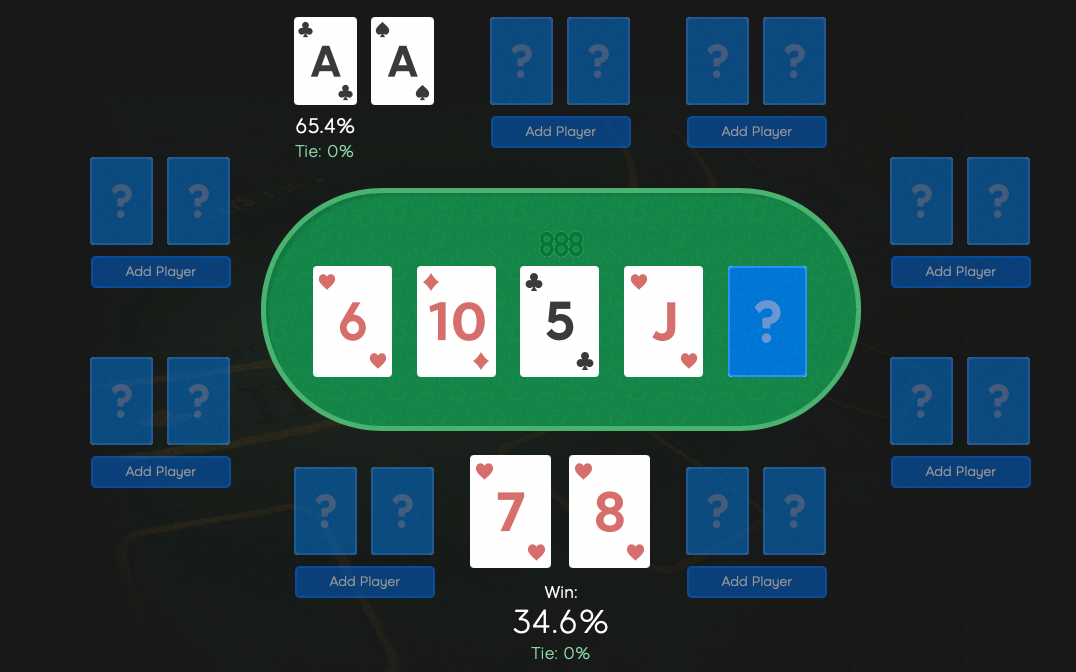
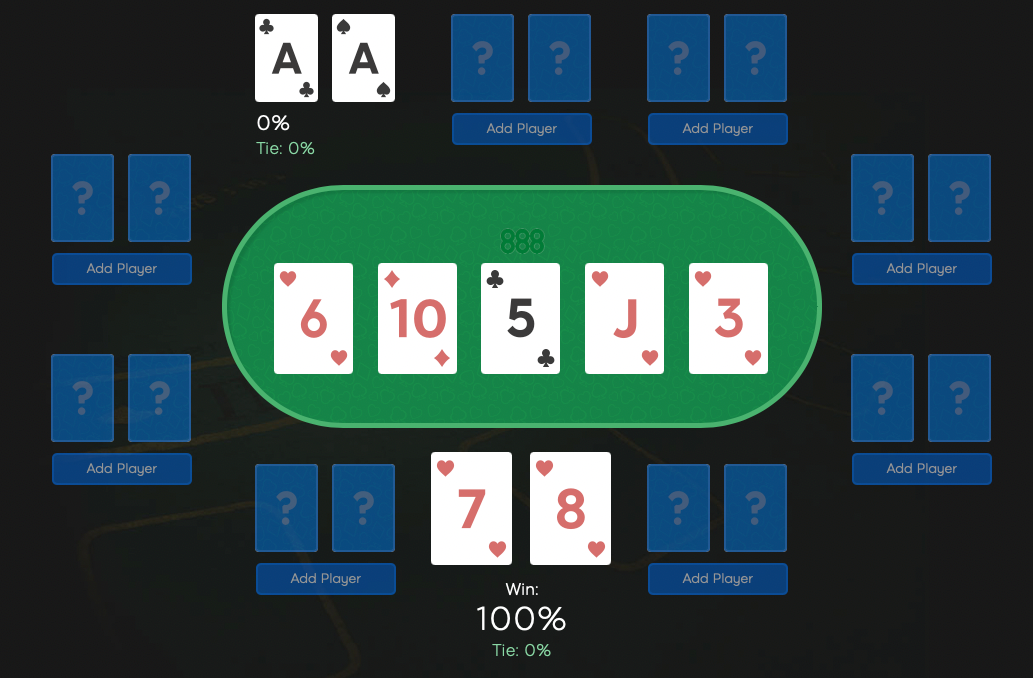
"The pro" pumps his fist in victory. "That's my favorite hand - I always win with that hand!" My friend, looking confused, gets up from the table defeated and searches for something else to play. Later he tells me he does better at Roulette, so that's what he'll stick to. But, unfortunately, both players got the wrong message from their results.
Annie Duke, retired poker player and author of Thinking in Bets, calls this "Resulting." Resulting is our tendency to equate the quality of a decision with the quality of its outcome, which she believes is the wrong way to measure a decision.
When trying to improve at anything, feedback is critical. For example, if you are learning how to ride a bike or anything that has a direct cause and effect relationship, feedback through results is immediate. You know you made a good decision pretty quickly - either it works, or it doesn't, allowing you to adjust on the next try.
However, many decisions we face are not so simple. We have to make decisions with incomplete information for what will happen, and we often won't get immediate feedback if our strategy is working.
Life and business are similar to poker; you know some, but not all, of the cards in play. Decisions are similar to bets, and you never know what's going to come next. So in this article, we will cover some concepts to improve decisions when we don't have complete information.
Results
When people adjust their behavior solely based on results, it can lead to worse decision-making in the future. Most people measure the wrong thing when it comes to making good decisions.
Duke, also a business consultant, asks her clients about their worst decisions when she starts working with them; she has yet to have someone tell her about their worst decision — they always respond about their worst result.
But aren't results all that matter?
Let's say someone drives home drunk, but they make it home okay without hurting anyone or themselves. Based on their results (they made it home safely), they made the right decision. But of course, if they were to continue to make that decision, they would likely get a DUI, hurt themselves or someone else. We call this bad judgment. Let's avoid that.
So over time, bad decisions = bad results.
In contrast, Las Vegas didn't become Las Vegas by worrying about short-term results. "The house always wins" because their games (or bets) are designed to win in the long run. Therefore, they are less worried about winning or losing on a given night. Instead, they worry about winning over time.
So over time, good decisions = good results.
While results do matter, when it comes to grading decisions, it's more of a question of how tightly correlated those results are to the decisions that gave you those results. More complexity and unknown variables - the less immediate your results.
The more unknown variables that lead to our intended result, the more complicated the decision. And we are not great at naturally dealing with decisions that deal with complexity.
There are two main reasons that good decision-making in these scenarios is so hard - luck and human nature.
Luck
We can plan for the future, but no one has a way of predicting the future. There are just too many variables to account for than the human mind can comprehend. And precisely what makes a decision difficult is that we don't know what the correct answer is.
We also have to contend with many factors outside our control. We know about and do our best to predict what we can - but some we can't foresee. We would call that luck (or randomness for people who don't believe in "luck").
Therefore we have to embrace uncertainty and luck. We have to use a different strategy to grade our decisions as good or bad. In the short run, a good decision can lead to a bad result, and a bad decision can lead to a good result.
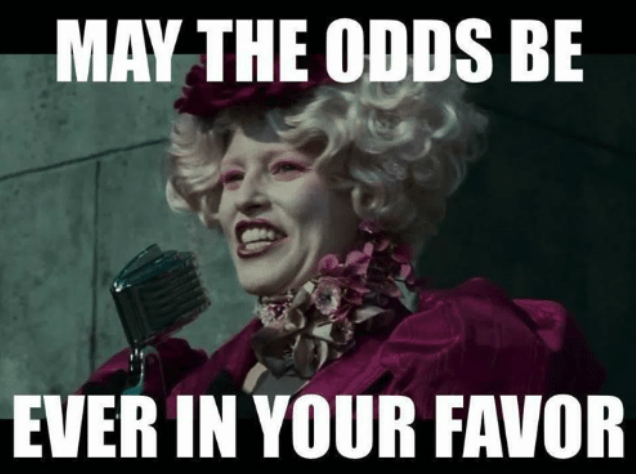
Human Nature
If it wasn't enough to live in an uncertain world, we also have to contend with flaws in how we perceive our uncertain world. We don't naturally see it very clearly, making it harder to make good decisions.
We are built to notice associations and coincidences, but our minds do their best to create shortcuts to minimize complexity. If it didn't, most likely, our minds would be overwhelmed with all the world's complexness, and we wouldn't be able to function.
So what are some of those shortcuts?
Our brain is "motivated" to discredit information that disconfirms our beliefs and doesn't work very hard to disconfirm information that agrees with our beliefs. We also tend to bend our judgment toward the outcome we want and not what's most likely.
We tend to blame or credit people for outcomes due to circumstances outside their control. This is especially true when it comes to ourselves. We tend to attribute our positive results to skill and attribute our negative results to luck. In the world of our mind, it's just easier this way.
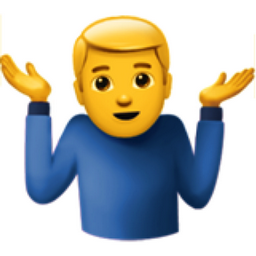
We also see the world as having a linear and logical cause and effect. Our minds naturally fill in the blanks and give us reasons why things happened, even if they aren't true. We play "Monday morning quarterback" and judge decisions as right or wrong instead of observing probabilities.
For example, let's use the example from my friend. He had a 76.6% chance of success. That's pretty good odds, meaning he made the right decision to play the hand. But it also means there is a 23.3% of failure. If the 23.3% scenario happens, we are more likely to think we made a bad decision because we failed. The reality is, we just saw the 23.3% scenario play out. But over time, the better decision will win.
While we have these tendencies to misjudge, we can also be aware of them and proactively use a process to counter them. Improving the decision-making process will put the odds in your favor over time and deliver you positive results in the long run.
So how can we apply practice to make better decisions?
Practicing the process of decision making
Anders Ericsson, a performance expert, and psychologist writes that specific goals and feedback are necessary for improvement. So we need to define what makes a great decision as a goal. Since this article is a poker analogy about life, we will go with Duke's definition. She writes;
"What makes a decision great is not that it has a great outcome. A great decision is the result of a good process, and that process must include an attempt to accurately represent our own state of knowledge."
A process can be objectively measured and improved over time. To improve decision-making, we need a process that factors our tendency to misjudge and accounts for uncertainty as much as possible. Here are some tips for building your process:
Have multiple mental models
Investor Charlie Munger speaks about having multiple models to compare information against. To someone with a hammer, everything looks like a nail. His advice is to learn the central ideas of different disciplines. The more rigorous a discipline is, such as hard sciences (physics, chemistry, biology, math, etc.), the better the model. But also learn core ideas in economics, psychology, and history. Then, you will have multiple models to view the world to determine which one is more credible in different circumstances.
Work backward
According to Duke, research shows that we do better when working backward from an identified goal. She cites research that found that imagining an event as if it has already occurred increases the ability to identify reasons for future outcomes by 3o%. You should also imagine adverse events happening as well. According to Gabriele Oettingen, 20 years of research shows people who imagine obstacles in the way of reaching goals are more likely to achieve success.
Farm for dissent
Our brain doesn't work very hard to disconfirm information that agrees with our opinions but is motivated to discredit information that we disagree with. Therefore, it is helpful to find people who naturally disagree with us and let them do the disagreeing. Farming for dissent is a process that Netflix has its employees go through before making decisions. The goal is to seek out opinions that disagree with yours deliberately. By listening to dissenting opinions, you can catch something you haven't thought about or at least tame your enthusiasm to be more objective.
Wisdom of crowds
At a county fair in 1906, Francis Galton observed 800 villagers entering a contest to guess the weight of an ox to win a prize. He reviewed all the guesses entered and plotted them on a graph. He found that individual guesses were well off from the correct answer, BUT all guesses averaged together were only a pound off. This phenomenon has since been studied in multiple settings and is called the "wisdom of crowds." However, each crowd member has to be independent for it to work. When multiple independent guesses are averaged together, they are often much closer to the correct answer.
Weigh people's advice differently
According to investor Ray Dalio, not all opinions are equal in every situation. When making investment decisions at his company, people with more credibility specific to the situation get more say in what the company does. Dalio uses a "believability" rating to weigh people's opinions. He says that believability is most likely to come from people who have accomplished what you want multiple times and can explain cause and effect relationships that lead to their conclusions. He also consults people who have a reputation for sound judgment and careful thought.
Document process
Document whatever process you use and write down your reasons for the decision you make. Some companies and investors even have people write a memo outlining their decision beforehand because writing clarifies your thinking. Be as specific as possible as this will be an essential tool when evaluating your decision. This will give you something tangible to review and measure, but you can't measure what you don't remember. Write down your thoughts.
Postmortem
Chess players who became grandmasters spent 5x more hours dedicated to serious study than those who played at the intermediate level. Virtually every sports team watches film to grade how they did. Companies will review their notes leading up to a decision to see what they missed and got right. Go back and check the reasons that led up to that decision. Even when the result is positive, go back and review.
Finally, how we prioritize our mental goals is essential. To make a good decision, our reasoning has to be as close to reality as we can manage. Therefore, it's more important to get it right than be "right."
Sources:
- Thinking in Bets: Making Smarter Decisions When You Don't Have All the Facts by Annie Duke
- Noise: A Flaw in Human Judgment by Daniel Kahneman, Olivier Sibony, and Cass Sunstein
- Peak: Secrets from the New Science of Expertise by Anders Ericsson
